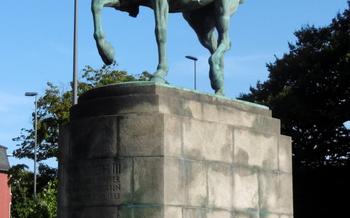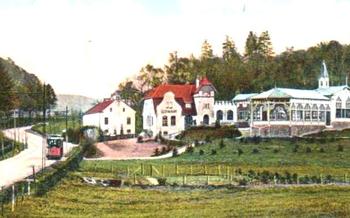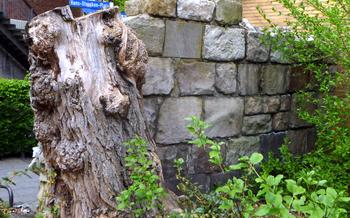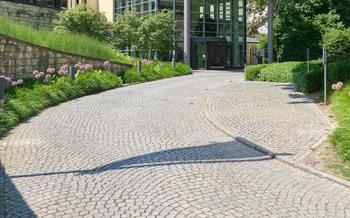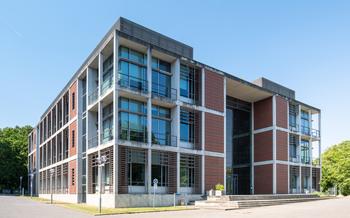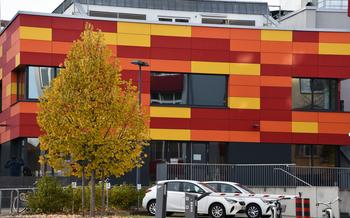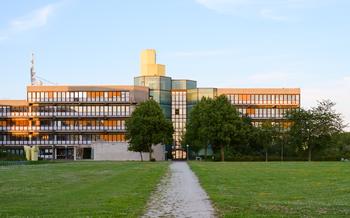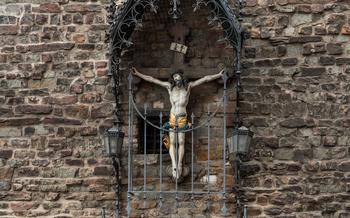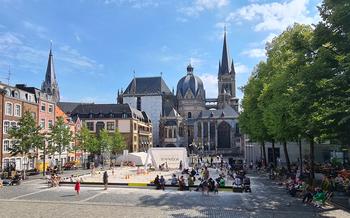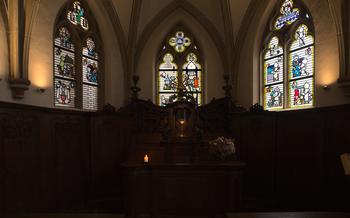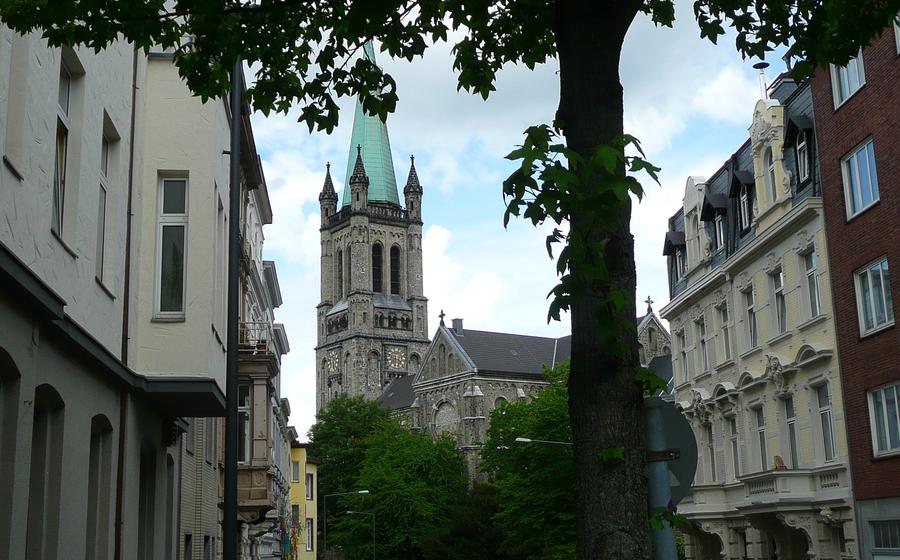
St. James's Church (Jakobskirche)
- Aachen Cathedral: A Stunning Masterpiece
- Elisenbrunnen: A Taste of Aachen's Healing Waters
- Aachen Town Hall: A Symbol of Civic Pride
- Suermondt-Ludwig-Museum: A Treasure Trove of Art
- Carolus Thermen: A Relaxing Oasis
- Ludwig Forum: Contemporary Art in a Historic Setting
- Ponttor: A Gateway to Aachen's Past
- Aachen Synagogue: A Symbol of Jewish Heritage
- Jewish Cemetery Aachen: A Place of Remembrance
- Aachen Hauptbahnhof: A Gateway to the City
- Aachen Market: A Feast for the Senses
- Insider Tip: Off-the-Beaten-Path Gems
Aachen Cathedral: A Stunning Masterpiece
Aachen Cathedral, also known as the Imperial Cathedral of Aachen, stands as a testament to the city's rich history and religious significance. Its foundation dates back to the 8th century when Charlemagne, the first Holy Roman Emperor, commissioned its construction as his royal chapel. Over the centuries, the cathedral underwent several expansions and renovations, resulting in a harmonious blend of architectural styles, from Carolingian to Gothic.
The cathedral's most striking feature is its Palatine Chapel, the heart of the building and Charlemagne's original creation. This octagonal-shaped chapel, with its soaring dome and intricate mosaics, is a prime example of Carolingian architecture. The chapel's interior is adorned with stunning frescoes and marble columns, creating a sense of awe and grandeur.
Within the cathedral's treasury lies a collection of priceless religious artifacts, including the Shrine of Charlemagne, a masterpiece of goldsmithing that holds the remains of the emperor. Other notable treasures include the Carolingian Gospel Lectionary, a beautifully illuminated manuscript, and the Aachen Cross, a processional cross adorned with precious stones.
Visiting Aachen Cathedral is a must for anyone interested in history, architecture, and art. Guided tours are available, providing insights into the cathedral's fascinating past and its significance as a UNESCO World Heritage Site. Whether you're a history buff, an art enthusiast, or simply seeking spiritual inspiration, Aachen Cathedral will leave you in awe.
Elisenbrunnen: A Taste of Aachen's Healing Waters
The Elisenbrunnen, a magnificent fountain located in the heart of Aachen, stands as a testament to the city's rich history and its reputation as a spa town. For centuries, people from all walks of life have flocked to Aachen to experience the healing properties of its thermal waters, which are believed to have therapeutic effects on a variety of ailments.
The Elisenbrunnen was built in the 19th century and named after Princess Elisabeth Ludovika of Bavaria, the wife of King Frederick William IV of Prussia. The fountain is a masterpiece of neoclassical architecture, featuring a graceful rotunda surrounded by 12 Corinthian columns. The central basin is adorned with intricate carvings and sculptures, depicting mythological figures and scenes from Greek mythology.
The Elisenbrunnen is not just a beautiful work of art; it also serves as a source of Aachen's famous mineral water. Visitors can sip the refreshing water directly from the fountain or purchase bottles to take home. The water is said to have a slightly salty taste and a distinct mineral composition that contributes to its healing properties.
The Elisenbrunnen is surrounded by a serene park, a perfect place to relax and soak in the tranquil atmosphere. The park is adorned with colorful flower beds, lush greenery, and shady trees, providing a welcome respite from the hustle and bustle of the city. Visitors can stroll along the park's winding paths, admire the beautiful sculptures, or simply sit on a bench and enjoy the peace and quiet.
Practical Information:
- The Elisenbrunnen is located in the center of Aachen, a short walk from the Aachen Cathedral.
- The fountain is open to the public 24 hours a day, and admission is free.
- Visitors can purchase bottles of Elisenbrunnen mineral water from the nearby tourist information office or from local supermarkets.
Aachen Town Hall: A Symbol of Civic Pride
In the heart of Aachen's bustling city center stands the majestic Aachen Town Hall, an emblem of civic pride and a testament to the city's rich history. This architectural masterpiece, completed in the 14th century, has served as the seat of Aachen's municipal government for over 600 years.
The town hall's awe-inspiring facade, adorned with intricate carvings and statues, reflects the city's opulence and power. Its grand entrance leads to a magnificent courtyard, surrounded by elegant arcades and galleries. Inside, visitors can marvel at the intricate frescoes and paintings that adorn the walls and ceilings, depicting scenes from Aachen's history and mythology.
The town hall's most iconic feature is its towering tower, which offers breathtaking panoramic views of the city and the surrounding countryside. Visitors can climb the tower's 156 steps to reach the observation deck, where they can admire the city's landmarks, including the Aachen Cathedral, the Elisenbrunnen, and the Suermondt-Ludwig-Museum.
The town hall square, where the town hall stands, is a bustling hub of activity. Surrounded by charming cafes, restaurants, and shops, the square is a popular gathering place for locals and tourists alike. During the Christmas season, the square transforms into a magical winter wonderland, with festive decorations, twinkling lights, and the enchanting Aachen Christmas Market.
Guided tours of the town hall are available, allowing visitors to explore its opulent interior and learn about its fascinating history. Special events, such as concerts, exhibitions, and receptions, are also held at the town hall throughout the year, offering visitors a chance to experience this architectural gem in a unique way.
Suermondt-Ludwig-Museum: A Treasure Trove of Art
Housed in a magnificent 19th-century building, the Suermondt-Ludwig-Museum is a must-visit for art enthusiasts visiting Aachen. The museum boasts a diverse collection of over 700 paintings, sculptures, and decorative arts, spanning from the Middle Ages to the present day.
The heart of the collection lies in its medieval art, which includes stunning examples of Gothic and Early Renaissance paintings and sculptures. Visitors can admire works by masters such as Stefan Lochner, Hans Memling, and Jan van Eyck, whose intricate and detailed paintings offer a glimpse into the artistic achievements of the period.
The museum also houses a remarkable collection of modern and contemporary art. Highlights include works by Max Ernst, Pablo Picasso, and Gerhard Richter, whose innovative and thought-provoking pieces challenge traditional notions of art and representation.
In addition to its permanent collection, the Suermondt-Ludwig-Museum regularly hosts special exhibitions, showcasing the works of renowned artists and exploring various artistic themes and movements. These exhibitions offer a dynamic and ever-changing experience for visitors, ensuring that there is always something new to discover.
Whether you are an art aficionado or simply looking for a cultural experience, the Suermondt-Ludwig-Museum offers a rich and rewarding journey through the history of art. With its diverse collection and engaging exhibitions, the museum is a true treasure trove for art lovers of all ages.
Carolus Thermen: A Relaxing Oasis
In the heart of Aachen, nestled amidst tranquil gardens, lies the Carolus Thermen, a haven of relaxation and rejuvenation. With a rich history dating back to the Roman era, these thermal baths have long been renowned for their therapeutic waters, believed to possess healing properties.
Step into a world of tranquility as you enter the Carolus Thermen, where the soothing sounds of flowing water and soft music create a serene ambiance. Immerse yourself in the warm, mineral-rich waters of the indoor and outdoor thermal pools, letting your muscles melt away and your mind unwind. Indulge in the invigorating heat of the various saunas and steam baths, each offering a unique sensory experience.
For those seeking a truly pampering experience, the Carolus Thermen offers an array of wellness treatments and massages. Skilled therapists provide rejuvenating massages, body wraps, and facials, using natural products to revitalize your skin and enhance your overall well-being.
Practical Information:
- Hours: Daily from 10 am to 10 pm
- Admission Fees:
- Day pass: €150
- Evening pass (after 6 pm): €150
- Children (6-14 years): €50
- Family pass (2 adults + 2 children): €500
To make the most of your visit, arrive early to secure a comfortable spot in the thermal pools. Remember to bring your swimsuit, towel, and sandals. The Carolus Thermen also offers a range of dining options, from light snacks to hearty meals, so you can refuel after your relaxing experience.
Ludwig Forum: Contemporary Art in a Historic Setting
In the heart of Aachen's vibrant arts district, the Ludwig Forum is a must-visit destination for contemporary art enthusiasts. Housed in a former factory building, the museum seamlessly blends the historic charm of its industrial past with a cutting-edge showcase of modern artistic expressions.
The Ludwig Forum's collection boasts a diverse range of artworks, from paintings and sculptures to installations and multimedia pieces. Visitors can peruse works by renowned international artists, as well as emerging local talents, offering a comprehensive insight into the ever-evolving world of contemporary art.
Beyond its permanent collection, the Ludwig Forum hosts a variety of special exhibitions throughout the year, showcasing the latest trends and innovations in the art world. These exhibitions often include interactive elements, allowing visitors to engage with the art in a meaningful and immersive way.
Educational programs and workshops are also a key part of the Ludwig Forum's mission, providing opportunities for visitors to learn about contemporary art and express their own creativity. Whether you're an art aficionado or simply looking for a unique and stimulating experience, the Ludwig Forum is sure to leave a lasting impression.
Practical Information
- Address: Jülicher Straße 97-109, 52070 Aachen, Germany
- Hours: Tuesday-Sunday, 11am-6pm
- Admission Fees: Adults €8, Concessions €4
- Guided Tours: Available upon request for groups of 10 or more
- Special Events: The Ludwig Forum regularly hosts special events, such as artist talks, workshops, and performances. Check the museum's website for more information.
Ponttor: A Gateway to Aachen's Past
The Ponttor, or Pont Gate, stands as a testament to Aachen's rich history and architectural heritage. Built in the 14th century as part of the city's fortifications, this impressive gate once served as the main entrance to Aachen from the west. Its sturdy towers, imposing drawbridge, and intricate carvings speak to the engineering prowess and artistic sensibilities of its time.
Today, the Ponttor stands as a symbol of Aachen's resilience and transformation. Having survived numerous wars and sieges, it has witnessed the city's evolution from a medieval stronghold to a thriving modern metropolis. Visitors to Aachen can marvel at the gate's well-preserved structure and imagine the bustling activity that once took place within its walls.
The surrounding area, known as the Pontviertel, is a vibrant neighborhood filled with charming cafes, independent shops, and historical landmarks. Visitors can wander through the narrow cobblestone streets, admire the colorful facades of the buildings, and soak in the unique atmosphere of this historic district.
The Ponttor is easily accessible on foot or by public transportation, making it a convenient stop on any Aachen itinerary. Whether you're a history buff, an architecture enthusiast, or simply someone looking for a glimpse into Aachen's past, the Ponttor is a must-visit destination.
Aachen Synagogue: A Symbol of Jewish Heritage
Standing tall in the heart of Aachen, the Synagogue serves as a testament to the rich Jewish heritage that has been an integral part of the city's history. Constructed in 1869, the Synagogue stands as a masterpiece of Moorish Revival architecture, showcasing intricate details and a striking fusion of Islamic and Jewish influences. Its grandeur reflects the significance of the Jewish community in Aachen, a community that has played a vital role in shaping the city's cultural tapestry.
The Synagogue's interior is as captivating as its exterior, featuring a stunning main sanctuary with arched ceilings, elegant columns, and ornate chandeliers. The intricate stained-glass windows bathe the space in a warm, colorful glow, casting an ethereal ambiance that invites contemplation and reverence. The Aron Kodesh, the holy ark where the Torah scrolls are kept, is a work of art in itself, adorned with elaborate carvings and intricate metalwork.
Beyond its architectural beauty, the Synagogue holds a profound historical significance. It has borne witness to both joyous celebrations and moments of adversity faced by the Jewish community. During the dark days of the Holocaust, the Synagogue was desecrated and vandalized by the Nazis, a tragic reminder of the horrors that unfolded. After the war, the Synagogue underwent painstaking restoration, reopening its doors in 1955 as a symbol of resilience and renewal.
Today, the Synagogue stands as a vibrant center of Jewish life in Aachen. It hosts regular religious services, cultural events, and educational programs, fostering a sense of community and preserving the rich traditions of Judaism. Visitors are welcome to explore the Synagogue and learn about its history, immersing themselves in the tapestry of Jewish culture that has woven its way through the fabric of Aachen's identity.
Practical Information:
- Location: Synagogenplatz 7, 52062 Aachen
- Hours: Open for guided tours by appointment. Please contact the Jewish Community of Aachen for more information.
- Admission: Free admission for guided tours.
Jewish Cemetery Aachen: A Place of Remembrance
The Jewish Cemetery Aachen, established in 1841, stands as a solemn and poignant testament to the rich history and heritage of the Jewish community in Aachen. Located on a serene plot of land on the outskirts of the city, this cemetery holds within its boundaries a treasure trove of stories, traditions, and lives forever etched in stone.
The cemetery is adorned with an array of unique tombstones and memorials, each representing a chapter in the lives of those laid to rest here. The inscriptions, often written in Hebrew and German, provide glimpses into their identities, families, and contributions to the community. Many of the tombstones feature intricate carvings and symbols, reflecting Jewish traditions and cultural influences.
As you wander through the cemetery's tranquil paths, you'll encounter a sense of profound respect and remembrance. The peaceful atmosphere invites visitors to pause, reflect, and honor the lives of those who have passed on. Guided tours and educational programs are available for those seeking a deeper understanding of Jewish history, culture, and the significance of this sacred site.
Practical information for visiting the Jewish Cemetery Aachen:
- Location: The cemetery is situated at Lütticher Straße 79, 52074 Aachen, Germany.
- Hours: The cemetery is generally open to the public during daylight hours, but it's advisable to check with the local Jewish community for specific visiting times.
- Admission: Entrance to the cemetery is free of charge.
- Guided Tours: Guided tours in German and English are available upon request by contacting the Jewish community of Aachen.
- Respectful Behavior: Visitors are kindly requested to maintain a respectful demeanor while visiting the cemetery, as it is a place of mourning and remembrance.
Aachen Hauptbahnhof: A Gateway to the City
Aachen Hauptbahnhof is not just a transportation hub but also a symbol of Aachen's significance as a major city in Germany. The impressive architecture of the station building, dating back to the 19th century, reflects Aachen's rich history and its status as a prominent railway junction. The grand facade, with its intricate details and arched windows, hints at the bustling activity within.
Inside the station, travelers are greeted by a spacious and modern interior, featuring a high ceiling with intricate ironwork. The station's central hall is a hive of activity, with passengers rushing to catch their trains, vendors selling snacks and souvenirs, and information desks providing assistance to visitors.
Beyond its practical function, Aachen Hauptbahnhof also offers a glimpse into the city's diverse culinary scene. The station is home to a variety of restaurants, cafes, and bakeries, catering to the needs of travelers and locals alike. Whether you're looking for a quick bite before your journey or a leisurely meal to savor the local flavors, Aachen Hauptbahnhof has something to offer.
For those arriving in Aachen by train, the station's convenient location makes it easy to explore the city's attractions. The city center, with its historic landmarks, shopping streets, and vibrant squares, is just a short walk away. Whether you're visiting Aachen for business or pleasure, Aachen Hauptbahnhof serves as a welcoming gateway to this fascinating city.
Aachen Market: A Feast for the Senses
Amidst the vibrant tapestry of Aachen's attractions, the Aachen Market stands out as a vibrant hub of commerce and culinary delights. Steeped in history, the market has been a cornerstone of the city's economy and social life for centuries. Every week, vendors from near and far gather to showcase their wares, creating a kaleidoscope of colors, aromas, and flavors that entice visitors from all walks of life.
The market offers a smorgasbord of fresh produce, meats, cheeses, and baked goods, each carefully selected for its quality and freshness. Farmers from the surrounding countryside bring their finest harvests, ensuring that shoppers have access to the best fruits, vegetables, and herbs of the season. Artisans display their handcrafted wares, from intricate jewelry to unique pottery, adding a touch of artistry to the market's offerings.
Beyond the stalls, the market exudes a lively atmosphere that is as captivating as the goods themselves. The air is filled with the cheerful chatter of vendors and the laughter of customers as they barter and socialize. The scent of freshly baked bread wafts through the air, mingling with the aromas of roasted nuts and sizzling sausages.
For those seeking a culinary adventure, the Aachen Market is a haven of gastronomic delights. Sample the region's famous Printen, a traditional gingerbread cookie, or indulge in a hearty slice of Flammkuchen, a crispy flatbread topped with crème fraîche, onions, and bacon. Wash it all down with a refreshing Kölsch beer, a local specialty brewed in Cologne.
Practical Information:
- Location: The Aachen Market takes place in the heart of the city, on the Markt square, in front of the city hall.
- Days and hours: The market is held twice a week, on Tuesdays and Fridays, from 7:00 am to 1:00 pm.
- Tips: Arrive early to get the best selection of produce and avoid the crowds. Be sure to bring cash as many vendors do not accept cards.
Insider Tip: Off-the-Beaten-Path Gems
Beyond the well-known attractions, Aachen is home to a wealth of hidden gems that offer unique experiences and insights into the city's rich history and culture. For those seeking to venture off the beaten path, here are a few insider tips:
-
Explore Aachen's Historic Neighborhoods: Discover the charming neighborhoods of Aachen, each with its own distinct character. Wander through the narrow cobblestone streets of the Pontviertel, admire the colorful facades of the houses in the Frankenberger Viertel, or soak in the vibrant atmosphere of the Westviertel, known for its trendy boutiques and cafes.
-
Visit the Ludwig Forum Underground: Located beneath the Ludwig Forum, this subterranean exhibition space showcases contemporary art in a unique and immersive setting. Experience thought-provoking installations and artworks that challenge conventional notions and push the boundaries of artistic expression.
-
Indulge in Local Delicacies: Aachen boasts a culinary scene that is both diverse and delicious. Sample the city's signature dish, Aachener Printen, a traditional gingerbread cookie with a unique blend of spices. Indulge in the hearty flavors of Rheinischer Sauerbraten, a regional beef dish marinated in vinegar and red wine, or savor the sweet and tangy taste of Aachener Quark, a local specialty made from fresh cheese.
-
Discover the City's Hidden Courtyards: Aachen is home to a number of hidden courtyards, each with its own charm and history. Step into the tranquil courtyard of the Couven Museum, surrounded by beautifully preserved historic buildings, or find solace in the serene atmosphere of the Innenhof of the Aachen Cathedral, a hidden oasis in the heart of the city.
-
Explore the Surrounding Countryside: Take a break from the city and explore the picturesque countryside surrounding Aachen. Hike through the lush forests of the Eifel National Park, marvel at the stunning views from the top of the Lousberg hill, or cycle along the scenic routes that wind through the region, offering breathtaking panoramas and opportunities to connect with nature.
